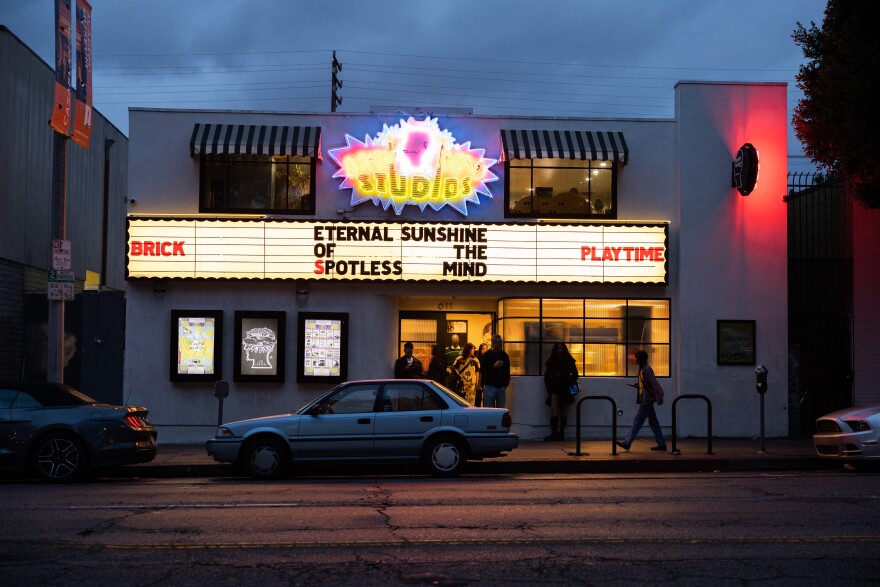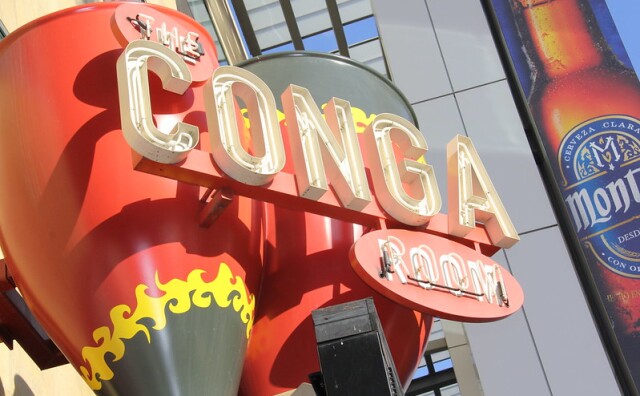Brain Dead is a fashion brand that’s been around Los Angeles for 10 years now, and has stores in Tokyo, New York, and London. You’ve probably seen its skate and post punk inspired pieces on cool kids around the city: graphic tees, fuzzy sweaters, A24 collabs. (If you look closely, you can even catch a Brain Dead shirt on oldest daughter Margo in the Despicable Me 4 trailer.)
You’ll also see their logo on the marquee of the old Silent Movie Theater on Fairfax, or, as it’s known now, Brain Dead Studios.

Take a listen as we explain the history and present of this theater.
The company’s founder, Kyle Ng, took over the 82-year-old theater and reopened it in October 2020. The venue came with quite a bit of baggage that we’ll get into later, but Ng said he was driven by his love of indie film and concerns about the many theater closures during the pandemic.
“It was from film and music that I learned about anything about fashion,” he said. “We need to keep places like this alive to inspire generations.”
The Brain Dead touch
The 163-seat theater has digital and 35mm projection capabilities, and sits just up the street from the iconic Canter’s Deli. There’s a retail showroom upstairs and a patio and cafe, Heavy Head, in the back. It’s an inviting space.

“I realized that I wanted to create a place where it was more inclusive and more inviting to an audience that maybe never felt like they were being spoken to by the repertory cinema,” Ng said.
Ng came to Los Angeles to work in film shooting music videos after being inspired by picking up a copy of RES magazine. He was hanging out with Rick Stello in the import DVD section of Meltdown Comics, picking up official releases of international films like Oldboy and Battle Royale.
“Through curiosity we learn and get excited about different things we've never learned about,” said Ng. That curiosity that led him from comics and music to film and fashion. Now, with the movie theater, Ng said his team can “take risks and do things to make the theatrical experience a little different.”
Brain Dead Studios has screened docs for the skateboarding community, hosted Magic the Gathering tournaments and created fashion collaborations with some of the films it’s screened, like Eternal Sunshine of the Spotless Mind.
And it leans on its audience for feedback.

Like many repertory theaters in 2024, the Brain Dead audience is young. If folks sign up for a monthly membership at the theater, (that’s $28 a month for unlimited film screening tickets and a 10% discount on clothing and concessions) they’re invited to write in with films they’d like to see.
“Most people wrote old titles,” Ng said. “And the cool thing is that old titles is so subjective to our audience because an old title might be Lost in Translation or it might be a '90s film.”
He noted that Sofia Coppola movies sell out, screenings of films like Speed Racer sell out, and anime will always garner interest.
It’s a connection to the theater’s past as a revival house, but with a slightly different niche.
The Silent Movie Theatre
The movie theater originally opened in the 1940s, built by John Hampton and his wife Dorothy. According to theater historian and film professor Ross Melnick, Hampton was a “massive silent film nut, if you will,” and loved silent cinema growing up in Oklahoma.
The Silent Movie Theatre was a classic mom-and-pop operation — Dorothy sold tickets and worked concessions, while John was in the projection booth screening his collection of silent film prints.
By the '40s, silent cinema was old news, so the theater filled a niche. Hampton’s collection was huge — an archival treasure trove of a medium known for being difficult to preserve. The couple screened films for 38 years.
By the 1980s, Hampton was having health issues and audiences were dwindling. He sold about half of his collection (most of which ended up in the archive at UCLA) and died in 1990. That’s when trouble broke out in his family.

As Melnick explained, his “nephew came in during a cleaning spree and just threw out hundreds of rare prints, posters, lobby cards — all that would be worth today, probably millions of dollars.”
Dorothy Hampton retained ownership, but the theater was empty until a family friend, Lawrence Austin, began running the space in 1991.
“He improved the theater, he brought in a live organist, and so it was, again, humming as the only operating silent movie theater in the country,” said Melnick. The theater was “attracting people from all over the world, not just those here in L.A.”
A troubled history
Lawrence Austin’s partner, James Van Sickle, was the theater’s projectionist, and the sole beneficiary of Austin’s estate. For about $30,000, Van Sickle hired a man named Christian Rodriguez to murder Austin and make it look like a robbery.
Austin was shot and killed, but another theater employee survived and identified Rodriguez, which led to Van Sickle. It was determined they had worked together, and both were sentenced to life in prison.
Charles Lustman, a singer-songwriter, purchased the theater in 1999 and reopened the space with silent films, a cafe, live acts and private party rentals. In the mid-2000s, deciding to rededicate himself to music and recently diagnosed with a rare bone cancer, he sold the theater to brothers Dan and Sammy Harkham.
Sammy, a 26-year-old cartoonist and Dan, 24 at the time, took over the space in 2006. Bringing in film producer Hadrian Belove, they opened Cinefamily in 2007. For 10 years, Cinefamily was one of the “hottest places to go see movies,” said Melnick.
Celebrities would come in for events, and you could catch anything from silent films to art house classics to indie premieres and retrospectives. “It was all given this kind of veneer of cool," Melnick added.
In 2017, allegations of harassment and abuse came to light. An investigation found “breaches of acceptable behavior alleged to have happened at Cinefamily offices and events,” according to a statement issued by the Cinefamily board of directors at the time.
Giles Miller, who spearheaded the investigation, told the Los Angeles Times his team reached “findings that were not conclusive, but that the board was able to work with." Executive director Belove and board member Shadie Elnashai apologized, resigned and denied the allegations. Cinefamily shut down permanently.
The Harkham brothers tried to reopen the theater with a new name, the Fairfax Cinema, detached from the former Cinefamily board in 2019, but due to issues finalizing opening night programming and the 2020 COVID shutdowns, the space stayed empty.
What's next?
Brain Dead Studios reopened in the theater almost four years ago with A Nightmare on Elm Street.
“I think spaces always have a history and you have to learn and adapt," Kyle Ng said. "And I think that's what we're trying to do.”
Every month, in addition to director spotlights (this month’s is Wong Kar-Wai), there will be signature drinks in the back with Heavy Head cafe. It’s all part of the storytelling, Ng said.

“And we're going to start serving wine. So there's going to be a lot more night events,” he added.
Brain Dead Studios has also been moving beyond just this theater on Fairfax.
“We've been able to [co]produce a couple films like Carpet Cowboys with Memory, which is an amazing documentary,” said Ng. That’s alongside short animations Brain Dead’s produced. “When you come to the movie theater, we have a lot of … incredible short films and animations by so many different artists.”
Ng wants to keep the theater accessible and inviting to the community as a place of inspiration. “That's what makes me happy and sleep at night,” he said.
Despite being an independent brand in an industry that’s not known for being a cash cow, Ng said that “even if it's hard, we will do our hardest to make sure that this place always has its lights on.”

Check out the Brain Dead Studios calendar of upcoming films here.







